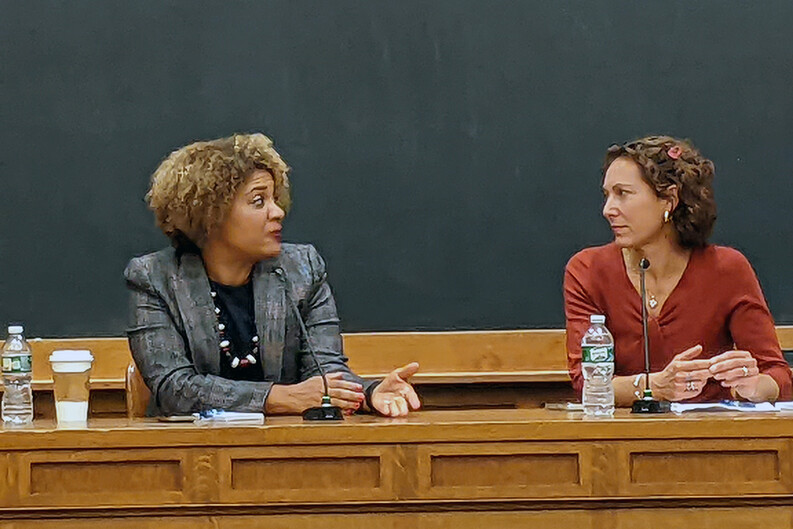Fatima Goss Graves ’01 Discusses Post-Dobbs Uncertainties

Fatima Goss Graves ’01, President and CEO of the National Women’s Law Center (NWLC), spoke to students on Oct. 25 about the impact of Dobbs v. Jackson Women’s Health Organization as part of the Democracy in Crisis Speaker Series presented by The Tsai Leadership Program.
Moderated by Lecturer in Law Emily Bazelon ’00, Goss Graves spoke to students about leading the NWLC and the broad ramifications of the Dobbs decision.
Goss Graves called leading the National Women’s Law Center a dream come true.
“I always wanted to work for gender justice and women’s rights and at that time, there were not that many jobs where you could use your law degree for gender justice and civil rights,” she said.
During the hour-long discussion, Goss Graves explained the potential criminal, civil, medical, and legal risks associated with the Dobbs decision. She described the criminal penalties and civil liabilities for current and future laws as creating a “chilling effect” and said the balance of power between states and the federal government is unclear.
“Long-standing federal statues such as existing nondiscrimination protections that are present in health care, housing, education, the workplace, and its rules around coverage for pregnancy and related medical conditions are being questioned,” Goss Graves said. “There is a baseline question around how providing information and talking about reproductive health care infringes upon a state ban.”
Bazelon and Goss Graves discussed questions arising in states from the Dobbs decision such as a memo released by the University of Idaho limiting the ability of faculty to talk about abortion and reproductive health in the classroom and whether a federal law allowing emergency care to poor and uninsured people can still be offered in Texas.
“We are now in a place where something went from being legal to suddenly becoming illegal and criminalized with civil penalties,” said Goss Graves. “What that does for a range of institutions and sectors, leads to giant uncertainty. It is such a leap to go from legal to criminalized with 100 years in jail as a violation.”
The Dobbs decision has also impacted how the legal community advises clients. Goss Graves said that lawyers like the certainty of being able to advise their clients on the risks associated with a decision, but now find themselves telling clients that risks are difficult to assess.
“Lawyers are making decisions based on the current legal landscape and on what will likely pass at the state legislative sessions in 2023,” said Goss Graves. “All the precedents that lawyers rely on and the way they think about precedent, is no longer in the same way. That is deeply destabilizing.”
Students asked questions ranging from how the NWLC addresses attacks on gender-affirming care and transgender people to how the NWLC advocates for issues and lobbies the executive branch.
“I appreciated Ms. Goss Graves’ insights on building coalitions and balancing priorities during times of crisis. It was important to learn about strategically adjusting policy and litigation frameworks to remain effective during shifting circumstances,” said Dominique James ’24.
“The discussion with Fatima Goss Graves covered not only reproductive rights, but also childcare, LGBTQ+ rights, and Title IX issues, and touched on some of the ways that these issues affect people of all ages and genders,” said Margie Adler, Executive Director of the Ludwig Program in Public Sector Leadership. “It was really inspiring to get a glimpse into how she began her long career with NWLC, the challenges she faces in advocating on these important topics, and how she approaches leading a large, multi-issue organization.”
The Tsai Leadership Program, launched a year ago, seeks to develop a curriculum for the next century as well as to teach critical skills to develop future leaders who are ready to tackle a diverse set of challenges in the private and public sectors.
For more information on The Tsai Leadership Program, visit the website4.


